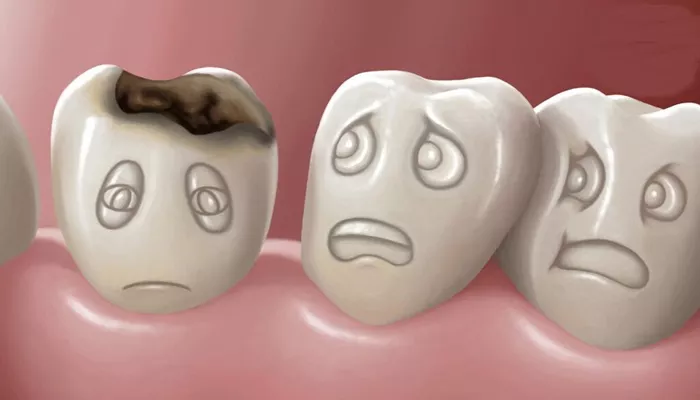Tooth decay, also known as dental caries, is a common oral health issue that occurs when the hard tissues of the teeth, namely enamel and dentin, are eroded by acids produced by bacteria in plaque. When tooth decay progresses to serious stages, it can lead to significant discomfort, infection, and even tooth loss. Addressing serious tooth decay requires a comprehensive approach that involves understanding its causes, recognizing its symptoms, and seeking professional dental treatment. Below, we will explore how to deal with serious tooth decay in a detailed and easy-to-understand manner.
Understanding the Causes of Serious Tooth Decay
Tooth decay is caused by a combination of factors, including bacteria, plaque, food, and time. Bacteria in the mouth feed on sugars and starches from food and produce acids as a byproduct. These acids attack the tooth enamel, gradually eroding it and creating small holes or cavities. Over time, if these cavities are not treated, they can grow larger and deeper, affecting the dentin and even the pulp of the tooth.
The risk of serious tooth decay increases with poor oral hygiene habits, such as not brushing and flossing regularly.
Frequency of sugar intake and the type of food consumed also play a crucial role. Sticky and sugary foods that remain on the teeth for long periods provide a rich environment for bacteria to thrive. Additionally, certain systemic factors like dry mouth, acid reflux, and certain medications can contribute to an increased risk of tooth decay.
Recognizing the Symptoms of Serious Tooth Decay
The symptoms of serious tooth decay can vary depending on the stage and severity of the decay. Initially, tooth decay may not cause any pain or discomfort. However, as the decay progresses, you may experience the following symptoms:
Sensitivity to Cold and Heat: Teeth with decay may become sensitive to cold and hot foods and drinks.
Pain When Eating or Drinking: You may feel pain or discomfort when chewing or consuming sweet or acidic foods.
Visible Cavities: Dark spots or holes on the teeth may be visible, indicating the presence of decay.
Bad Breath: Tooth decay can lead to bad breath due to the presence of bacteria and food particles in the mouth.
Swelling or Pain in the Gums: If the decay reaches the pulp of the tooth, it can cause infection and inflammation of the surrounding tissues.
Seeking Professional Dental Treatment
If you suspect you have serious tooth decay, it is crucial to seek professional dental treatment immediately. A dentist will assess your oral health, diagnose the severity of the decay, and recommend appropriate treatment options. Here are the steps involved in dealing with serious tooth decay:
Comprehensive Examination
The dentist will conduct a thorough examination of your teeth and mouth, including visual inspection, X-rays, and a probe to check for soft areas in the teeth.
Assessment of Decay Severity
Based on the examination, the dentist will determine the severity of the decay. They will classify it as mild, moderate, or severe based on factors such as the size of the cavity, involvement of the pulp, and presence of infection.
Treatment Options
Depending on the severity of the decay, the dentist will recommend one or more of the following treatment options:
Fillings: For mild to moderate decay, the dentist will remove the decayed portion of the tooth and fill the cavity with a restorative material such as amalgam (silver fillings), composite resin (tooth-colored fillings), or glass ionomer cement.
Crowns: For teeth with extensive decay, a crown may be necessary to restore the tooth’s shape, size, and function. A crown covers the entire tooth and is made from materials such as porcelain, metal, or a combination of both.
Root Canal Therapy: If the decay has reached the pulp of the tooth, causing infection or inflammation, root canal therapy may be required. This involves removing the infected pulp, cleaning and disinfecting the canal, and filling it with a special material. A crown is usually placed over the treated tooth to provide protection.
Extraction: In some cases, especially if the tooth is severely damaged or unsalvageable, extraction may be the only option.
The dentist will remove the tooth and discuss options for replacing it, such as with a bridge, implant, or partial denture.
Follow-Up Care
After treatment, it is essential to maintain good oral hygiene practices and schedule regular dental check-ups. This will help prevent future decay and ensure the longevity of the treatment.
Preventive Measures to Avoid Future Decay
Preventing tooth decay is always better than treating it. Here are some effective preventive measures you can take to protect your teeth from decay:
Brush and Floss Regularly: Brush your teeth at least twice a day with fluoride toothpaste, which helps strengthen tooth enamel and prevent decay. Floss daily to remove plaque and food particles stuck between teeth.
Limit Sugar Intake: Reduce your consumption of sugary foods and drinks, especially sticky and acidic ones that can erode tooth enamel. Opt for healthy snacks like fruits, vegetables, and cheese.
Use Fluoride Products: In addition to fluoride toothpaste, consider using fluoride rinses or gels to further protect your teeth.
Regular Dental Check-Ups: Schedule regular dental check-ups and cleanings to catch decay early and prevent it from progressing.
Sealants and Fluoride Treatments: Ask your dentist about dental sealants for your molars, which can protect the chewing surfaces from decay. Fluoride treatments can also be applied to strengthen enamel and prevent cavities.
Conclusion
Serious tooth decay is a significant oral health issue that requires prompt and professional attention. By understanding its causes, recognizing its symptoms, and seeking timely treatment, you can effectively manage and prevent tooth decay.
Preventive measures such as regular brushing and flossing, limiting sugar intake, and regular dental check-ups are crucial in maintaining good oral health and avoiding future decay. Remember, taking care of your teeth is an ongoing process that requires commitment and attention to detail. By making oral hygiene a priority, you can enjoy a healthy, pain-free smile for life.
Related topics:

